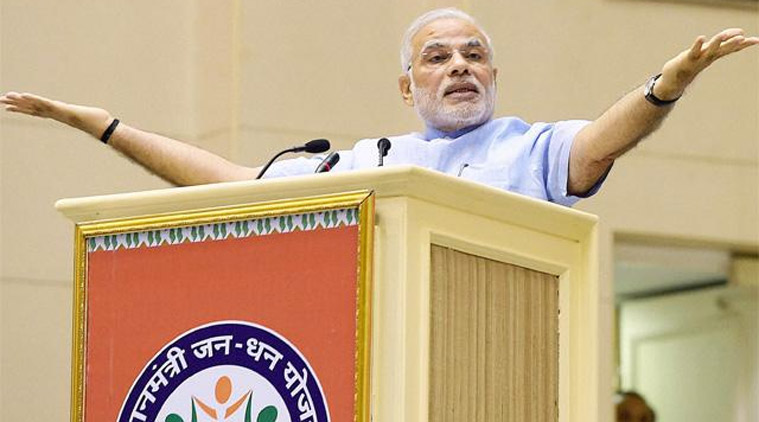http://indianexpress.com/article/lifestyle/books/book-review-a-mirror-to-power-by-m-j-akbar-whos-the-most-powerful-of-them-all/
The Indian Express
The Indian Express
Book Review – ‘A Mirror to
Power’ by M J Akbar: Who’s the Most Powerful of Them All?
Written by Vandita Mishra | Published on:May 2, 2015 12:00 am
Title: A Mirror to Power: Notes on a Fractured Decade
Author: M.J. Akbar
Publisher: HarperCollins
Pages: 328 Price: Rs 599
Author: M.J. Akbar
Publisher: HarperCollins
Pages: 328 Price: Rs 599
M.J. Akbar holds up a mirror to power at just the right angle. He catches the puffery and vanity, shows up the posing and pretence. And mostly, while subjecting the powerful to his elegant torture, he doesn’t appear to take himself too seriously. Early in the book, he tells us why the journalist should be more Joy Mukherjee, less Dilip Kumar.
Joy Mukherjee belonged to the pantheon of popular Hindi film stars of the Sixties. He looked sincere and affable on screen, when he could have played at being grand or epic, tragic or tragi-comic, or, at least, noble. Joy won the girl in the last reel “after struggles with snowflakes, without much strain on his IQ or ours”. He “became a surprise (and perhaps surprised) hit” in 1960, when Love in Simla was released alongside the legendary Mughal-e-Azam.
Like Joy, the journalist should stay away from high drama, suggests Akbar. “Good journalists should evade the temptation of piety, stop believing they are agents of either God or king, and let loose their primary instinct, which is flirtation with the audacious”. Keep it short, Akbar also advises, and the reader will wish that on this, he had not followed his own counsel. The essays in this book, barely two pages each, allow only abbreviated explorations that too often come to a stop at the one-liner.
But the reader may end the book with a more serious gripe, and a what-if. A Mirror to Power: Notes on a Fractured Decade covers the Manmohan Singh government years, when the UPA’s mix of Congress-style blundering and hauteur in a regime divided at the top provided rich pickings for the critic and satirist. Akbar roams the “gilded cages in the Delhi zoo”, stopping to poke fun at occupants, from the “comb-loving” Shivraj Patil to Montek Singh Ahluwalia — “both he and India would benefit from greater familiarity (with each other)”. He looks in at the press conference in September 2013 to chuckle at Ajay Maken’s face when Rahul Gandhi tears the ordinance — “it is such instances that revive the Indian’s deep and abiding faith in the medicinal qualities of laughter”.
But, by and large, he ignores the great and powerful outside Delhi, the regional players and parties. Or concentrations of power outside the political establishment, be it Big Business, or the Anna movement. When he does venture away from Delhi’s political zoo, he does a fine job in a gentler and longer essay, for instance, that plots pre-Independence Muslim history through four poets: Khusrau, who “sparkled with the energy of a new fire”; Ghalib, the “philosopher searching for the mysteries of a dying flame”; Akbar Allahabadi, who “sliced the pomposity of dubious priests”, and Muhammad Iqbal, who “thought that between a complaint and an answer, he had found a denouement”.
But here’s the serious gripe. The decade the book covers was also one in which Narendra Modi made his way from the state to the national stage, and to the top of his own party. Yet Akbar does not turn his unsparing gaze on Modi, or even the BJP, which as the main Opposition party, was a powerful address with its own collection of pretences and pieties. Whenever he does look at Modi, Akbar’s merciless eye moistens, and blinks.
Not surprising, you might say, from someone who once loved and lost the Congress, or was lost by it, and nurses some bitterness. It should not surprise, either, that a man who then joined the BJP spares the BJP. But Akbar joined the party only in March 2014. So, was he, for over a decade before that, choosing his targets accordingly?
In his essay on why he joined the BJP, the audacious Akbar comes perilously close to being pious. When bombs burst in Modi’s Patna rally and he carries on speaking, asking Hindus and Muslims to choose — “they could either fight each other, or together they could confront that shaming curse called poverty” — Akbar seems overcome. “This placed everything in context and priority”, he writes. And how does this Modi square with the Modi who presided over Gujarat 2002? In contrast to his take-no-prisoners style, Akbar ducks the question. His doubts about 2002 were answered, he says, “paradoxically… over 10 years by the UPA government”, which failed to establish Modi’s guilt in a court of law. At the end of the essay, Akbar makes a declaration again remarkable for the acerbic scepticism gone missing: “There is only one way forward. And there is, among the visible choices, only one person best suited to lift the nation out of a septic swamp”.
Elsewhere in the book, writing in July 2014, after Modi has won the election and Akbar has joined the BJP, words that should still sound embarrassingly mawkish: “…the country senses an absence if he shifts to the background for even a week or a fortnight… August needs a return of that fresh breeze”.
Here, then, is the what-if: What fun it would be if Akbar would train that piercing gaze and gifted pen to cut down to size a Modi government that paints itself larger than life like all governments, and more than all governments.

No comments:
Post a Comment